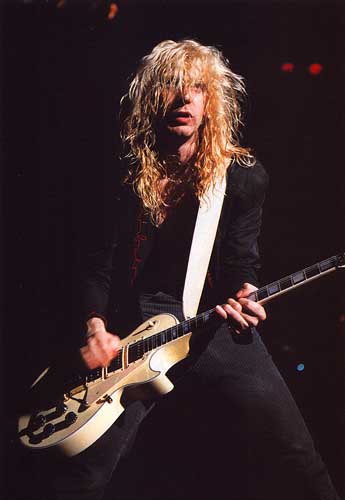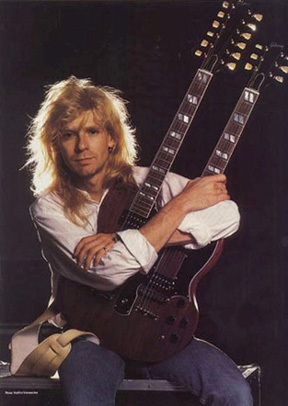Stephen Maynard Clark, popularly known as Steve Clark, joined the British hard rock band ‘Def Leppard’ in January 1978 as a co-lead guitarist and remained with the group till his untimely death in 1991.
Born on April 23, 1960 in Hillsborough, a suburb of Sheffield, Steve spent his early days in his home town. Right from his childhood, Steve evinced keen interest in music and when he was 11, he requested his father for a guitar. While Steve’s father granted his wish with reservations that he would learn to play the instrument, much earlier, when he was merely six, Steve’s mother took him to a performance by The Shadows.

Steve idolized Led Zeppelin’s Jimmy Page and since he heard his favorite playing "How Many More Times," he seemed to be enchanted with the sound of the stringed instrument and decided to make music his career. Steve was so mesmerized by Jimmy Page, that he mainly played the Gibson guitars during his tenure with Def Leppard.
Days With Def Leppard
Prior to becoming a member of Def Leppard, Steve played title music with his minor band called ‘Electric Chicken’ in Sheffield. It was sometimes then that Steve had a chance meeting with Def Leppard's founder and original guitarist Pete Willis. In fact, it was Steve who requested Pete for a place in the band and joined Def Leppard in January 1978. But before this, Steve auditioned for Def Leppard by playing all of Lynyrd Skynyrd's "Freebird".
As a member of Def Leppard, Steve played a vital role in the band's music and lyrics. Although Steve and Pete Willis split the duties of the lead guitar in the band between them, it is said that a lot of Def Leppard’s prized music was accredited to Steve’s genius. A noteworthy song that displays Steve's symbolic guitar noted is "Switch 625" off of High 'n' Dry.
Although the other members of Def Leppard considered Steve as a great guitarist and a performer, his work with the group was gradually being interrupted owing to his alcoholism. Later, Def Leppard’s lead singer Joe Elliott revealed that while the other band members would be seen engaged in soccer, visiting family, or watching a movie, Steve was only involved with drinking and playing guitar. As a matter of fact, one night, Steve was out in the open in a comatose with a blood/alcohol level of .59 in Minneapolis.
Great Showman
Unfortunately, Steve's alcoholism was critically ruining his musical career since the late 1980's. He regularly came for rehearsals and recording in an inebriated condition leading to tribulations. Interestingly, though Steve’s responsibility with the band was restricted, but once on stage, he was always prepared, talented and also somber. It may be noted here that in 1992, the song ‘White Lightning’ in the album ‘Adrenalize’ was penned keeping Steve Clark in mind, as the members fondly dubbed him "White Lightning" for his habitual penchant to use white clothes on stage.

Nonetheless, Steve is perhaps remembered best for the influential notes that impelled Def Leppard's first four albums in the 1980s. And Steve himself was nicknamed as "The Riffmaster". Even today, his characteristic mode can be heard in on "Wasted" (from On Through the Night), "Bringin' on the Heartbreak" (from High 'N' Dry), "Die Hard the Hunter" (from Pyromania) and "Gods of War" (from Hysteria).
The End
Prior to his death in 1991, Steve contributed to half of the songs on the band's 1992 album "Adrenalize". On January 8, 1991, Steve’s girlfriend Janie Dean was shocked to discover him dead on his couch. An autopsy conducted on his body exposed that his end came owing to consumption of a blend of anti-depressants, painkillers and alcohol. The police, however, ruled out any possibility of suicide.
